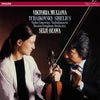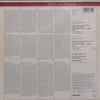



Tchaikovsky & Sibelius - Violin Concertos - Viktoria Mullova & Seiji Ozawa (2LP)
Pyotr Ilyich Tchaikovksy - Violin Concerto in D, Op. 35
Jean Sibelius - Violin Concerto No. 1 in D Minor, Op. 47 [click here to see more vinyl from Jean Sibelius]
Viktoria Mullova - violin
Boston Symphony Orchestra
Seiji Ozawa - conductor
2 LP, Gatefold
Original analog Master tape : YES
Heavy Press : 180g
Record color : black
Speed : 33 RPM
Size : 12'’
Stereo
Studio
Record Press : Pallas GmbH in Germany
First time ever on vinyl records
Label : Analog Phonic
Original Label : Philips
Recorded 17-19 October 1985 at the Symphony Hall, Boston
Mastered by Sidney Claire Meyer at Emil Berliner Studios in Berlin
Originally released in 1986
To be reissued in 2022
Tracks:
Side A - Tchaikovksy - Violin Concerto in D
- Allegro moderato
Side B - Tchaikovksy - Violin Concerto in D
- Canzonetta (Andante)
- Finale (Allegro vivacissimo)
Side C - Sibelius Violin Concerto No. 1
- Allegro moderato
Side D - Sibelius Violin Concerto No. 1
- Adagio di molto
- Allegro, ma non tanto
Awards:
Grand Prix International du Disque de l'Académie Charles Cros 1987
Reviews:
“Listening to the Mullova again confirms my earlier impression. The Sibelius is magnificent: stern, vigorous and entirely free from the kind of sentimental inflation that has distorted our view of this work. Her Tchaikovsky is harder to take: here I definitely prefer Nigel Kennedy's genial and warm approach, even though it sounds a little low-powered after the intensity and energy of Mullova. The sound on the Mullova disc is magnificently spacious with the soloist well forward, though on CD the sense of distance between solo violin and various instrumental groups tends to sound wider than on LP, especially in the Sibelius: the stopped horns at fig. 4 in the finale sound as if they're coming from a completely different part of the hall. Kennedy's recording sounds entirely natural, so that for the most part one is hardly aware of it. the soloist is reasonably close, but the violin/orchestra perspective is nicely judged. In both recordings the violin tone is well captured: even Mullova's terrifying crescendo molto at fig. 6 in the first movement of the Sibelius is contained without loss of impact.
Comparing the listed recordings, Mullova, I think, wins outright in the Sibelius, though the Amoyal (Erato) is certainly agreeable without being too sentimental; it's also well recorded—violin forward again, but with a firm presence. Kremer's EMI performance (coupled with the Schumann) is well thought out, but most of the time it runs at a rather low voltage. For the Tchaikovsky it's not so easy. Kennedy's is an appealing performance, though Amoyal's affetuoso has a truly natural quality that makes Kennedy sound a trifle arch. Chung's combination of sweetness and technical super-accomplishment (Decca) has endeared her to many; I find her Tchaikovsky somewhat characterless in comparison, and the sound tends to thinness in orchestral tuttis.” Stephen Johnson, Gramophone
Ratings :
Discogs : 4.69 / 5



